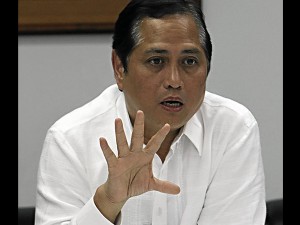Philippine gov’t defers foreign bond swap plan

NATIONAL TREASURER ROBERTO TAN: Not the right time to do bond swap. INQUIRER PHOTO / GRIG C. MONTEGRANDE
“Now is not the right time to do it [bond swap] given that the market is too volatile,” National Treasurer Roberto Tan said Tuesday after the Senate hearing on the proposed 2012 national budget.
Tan said the Bureau of the Treasury would study the market and determine first if jitters arising from the debt situation of the United States have subsided before considering any bond swap.
Under the bond swap, formally called the Debt Consolidation Program, the government issues new bonds and offers these to existing holders of bonds that are about to mature. The objective is to lengthen the maturity of the country’s foreign debts.
The swap may also entail an exchange in currency denomination. The government may swap newly issued peso-denominated bonds with dollar-denominated securities to reduce the country’s exposure to foreign exchange risk.
Last month, the government was able to successfully implement a bond swap in the domestic capital market, exchanging P323.5 billion worth of bonds.
Article continues after this advertisementThis time, the government wanted to undertake a similar activity involving dollar-denominated bonds in the international capital market. The finance department has yet to announce how much new bonds it would offer for the exchange.
Article continues after this advertisementThe planned bond swap has been already approved by the Bangko Sentral ng Pilipinas, which said the plan was not expected to create problems related to liquidity and the exchange rate.
However, Tan said the behavior of the international market since last weekend has made it imprudent to pursue the debt swap now.
Tan said the Treasury was monitoring the international bond market to determine the proper time to undertake the bond swap.
“The timing will depend on market conditions,” Tan pointed out.
Last Saturday, the credit rating of the United States was downgraded by a notch, or from AAA to AA+ by Standard & Poor’s, which raised concern over the debt situation in the world’s biggest economy.
The downgrade came after a tedious debate by legislators over whether or not to raise the US debt ceiling. Congress eventually agreed to raise the debt ceiling, beating the August 2 deadline. Without such a move, the US government would have been prevented to borrow and risked being declared in default.
Although the debt ceiling was raised, S&P said the long debate in Congress that placed the Obama administration at risk of defaulting reflected a deterioration in the credit-worthiness of the United States.